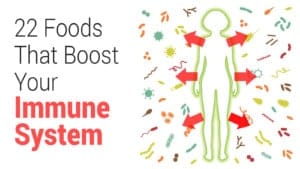The immune system is the body’s line of defense against viruses, bacteria, and other microbes. These things all can cause infection and disease. It is also often responsible for protecting you against life-threatening diseases. As such, it’s reasonable to worry about a weak immune system. It leaves you susceptible to so many health problems! So it’s up to you to seek innovative ways to support your immune system.
Luckily, you can bolster your immune system in surprisingly simple and noninvasive ways – all backed by science! Here’s how studies and experts reveal 4 natural ways to support the immune system.
1. Exercise
 The immune system can only be healthy when your body is healthy. Plus, it’s a generally known fact that exercise is crucial in maintaining optimal bodily health. As such, it’s no surprise that working out may have positive effects and support the immune system.
The immune system can only be healthy when your body is healthy. Plus, it’s a generally known fact that exercise is crucial in maintaining optimal bodily health. As such, it’s no surprise that working out may have positive effects and support the immune system.
Wellness expert and nutritionist Cathy Wong states that exercise, particularly moderate-intensity, can significantly benefit the immune system. However, exercising too little or too much may have the opposite effect, so you should work out in moderation.
Here are some studies that support the concept of exercise to boost immunity:
- “Exercise and the Regulation of Immune Functions” published in Progress in Molecular Biology and Translational Science (2015). This study showed that in individuals with compromised immunity, vaccines could be made more effective through even just one moderate exercise session. It further noted that regular exercise, of a moderate variety, could aid in cell regeneration and reduce illness-causing inflammation.
- “Debunking the Myth of Exercise-Induced Immune Suppression: Redefining the Impact of Exercise on Immunological Health Across the Lifespan” published in Frontiers in Immunology (2018). This fascinating research paper found that exercising regularly can lower chronic disease risk and help protect the body against infections of a bacterial and viral variety. It also debunked the concept of immune system suppression caused by exercise.
- “The compelling link between physical activity and the body’s defense system” published in Journal of Sport and Health Science (2019). This in-depth study found that moderate exercise can mobilize the cells of the immune system, meaning it can fight pathogens, unwanted microorganisms, and even the growth of cancer cells. Regular exercisers experienced lower systemic inflammation and instances of illness and even enjoyed protection from aging.
It is recommended that you engage in at least 150 minutes of exercise per week, or 30 minutes spread across five days, or any other distribution you prefer. During exercise, you should experience an elevated heart rate if your heart isn’t pumping faster, up your workout intensity.
2. Maintain A Healthy Diet
What you eat dictates your health. You can’t experience positive health if you’re not eating well, as your body needs certain nutrients to function to its fullest. After all, the food you consume is used as energy and turned into building blocks for many bodily processes and parts.
Sandra Darling, a wellness expert, and preventive medicine physician, puts much faith in the power of healthy and nutritious food to maintain high immunity. While it’s safe to opt for whole foods and unprocessed foods, here are some more specific things you should have in your diet if you want better immunity:
· Whole Plant Foods
Plant foods include vegetables, fruits, seeds, and similar foods. They are rich in positive antioxidants that fight unstable and inflammatory free radicals that are the prime suspects in most illnesses. These foods are also packed with vitamin C and fiber, with the latter assists in healthy digestion and facilitates better immunity as a result.
· Protein
Protein is often overlooked in conversations about immunity, but their amino acids are actually part of the building blocks for immune cells. Too little protein can reduce your capability for fighting off disease and infection, say studies. If you’re already sick, upping protein intake may help speed up your recovery, too.
· Fermented Foods to Support the Immune System
Fermented foods aren’t everyone’s cup of tea, but through their acquired taste, you’ll find probiotics. Probiotics are a kind of positive bacteria that help keep the microbiome of your gut balanced and healthy. Gut health is crucial to fighting disease and maintaining overall health, so eating enough probiotics may be a simple way to raise immunity. Fermented foods you can try are kimchi, yogurt, kefir, sauerkraut, and natto.
· Healthy Fats
Many people believe that all fats are bad, but certain kinds are great for you and your immunity. Foods like olive oil, chia seeds, salmon, and other sources of omega-3 fatty acids reduce inflammation and help reduce chronic disease risk. They can also help you fight off viruses and bacteria, according to studies.
· Spices
Many spices are rich in properties that fight bad microbes, bacteria, and viruses, including those caused by spoiled food. Research indicates that thyme, clove, cumin, cinnamon, and oregano all have these properties.
· Garlic
It’s a bit of an odd one out on this list as a stand-alone food, but for a good reason. Garlic contains a special compound known as allicin. Allicin is a powerful way to boost immunity and kill unwanted bacteria and viruses, according to studies. While eating half a raw clove of the stuff daily is the best way to get enough allicin in your diet. But it’s understandable if you can’t stomach the taste. Roasted garlic provides a similar benefit; eat a little more of it!
 3. Sleep Well
3. Sleep Well
Are you getting a good night’s rest? Are you sleeping for long enough and with good enough quality to feel refreshed in the morning? According to Registered Dietitian Nutritionist and Licensed Dietitian SaVanna Shoemaker, immunity and sleep are linked closely. Most studies on the subject show that poor sleep can lead to an increased risk of contracting an illness.
Here are some research papers that found these results:
- “Immune, inflammatory and cardiovascular consequences of sleep restriction and recovery” published in Sleep Medicine Reviews (2012). This study showed that sleeping for a full eight hours every night can help with immune system regulation.
- “Sleep and immune function,” published in Pflügers Archiv: European Journal of Physiology (2012). This paper discussed how during sleep, the body distributes and produces immune cells crucial to the body, such as T cells, cytokines, and interleukin 12. In other words, too little sleep could reduce the production of these positive components to your health.
- “Behaviorally Assessed Sleep and Susceptibility to the Common Cold,” published in Sleep (2015). This study found that, among 164 adults of good health, those who sleep less than 6 hours per night have a higher risk of contracting a cold.
- “Association of Insufficient Sleep With Respiratory Infection Among Adults in the United States” published in JAMA Internal Medicine (2016). Research here indicated that sleeping less than 6 hours every night could increase the risk of developing a respiratory infection.
- “Is Insomnia a Risk Factor for Decreased Influenza Vaccine Response?” published in Behavioral Sleep Medicine (2017). Individuals with insomnia have a higher risk of developing the flu even if they receive a vaccination, according to this research
- “The Sleep-Immune Crosstalk in Health and Disease” published in Physiological Reviews (2019). This research paper indicated, in simple terms, that sufficient rest has positive effects on overall immunity. It also stated that, if you are sick, sleeping more can help boost recovery speed.
How much sleep should you get to ensure a healthy immune system? The Centers for Disease Control and Prevention recommends 7 or more hours for adults, 8 to 10 hours for teenagers, and a maximum of 14 hours for infants and younger children.
4. Manage Stress
Stress seems like a purely emotional thing, but the lack of positive thinking and the strain on the mind and body can actually have more of an impact than you may think. As it turns out, being too stressed out could decrease your immune system’s ability to perform at its best.
Here are some studies that indicate this further:
- “Psychological Stress and the Human Immune System: A Meta-Analytic Study of 30 Years of Inquiry” published in Psychological Bulletin (2004). This review was a landmark work in its time, involving 18,941 participants across 293 studies. This review found that short-term stress is positive for the immune system’s defenses, but prolonged experiences of stress can increase the risk of illness and break down the immune system’s strength.
- “Chronic stress, glucocorticoid receptor resistance, inflammation, and disease risk” published in Proceedings of the National Academy of Sciences of the United States of America (2012). This study explored the different natural and biological ways that the body responds to long-term, chronic stress, including increased inflammation and a worsened risk of developing the disease.
- “Effects of stress on immune function: the good, the bad, and the beautiful” published in Immunologic Research (2014). This study showed how long-term stress could result in inflammation, while proper management of stress could help keep immune cells balanced and functional.
- “Current Directions in Stress and Human Immune Function” published in Current Opinion in Psychology (2015). This review discussed how long-term stress could potentially lead to chronic elevation of the stress hormone known as cortisol. Cortisol can protect the immune system when it is produced correctly (during short-term stress). It works by preventing strong immune system responses before the end of events that trigger fight-or-flight responses. This allows your body to focus on the immediate cause of distress. But, in the long-term, constantly elevated cortisol levels mean that the body never gets the immune system response it needs. As such, chronic stress isn’t just a bane for positive thinking. It’s also bad for your body on the whole.
Doctors agree that reducing stress can help support the immune system
Orlando Health Medical Group Internal Medicine physician Ben Kaplan says there are many options for methods to reduce stress and states that each person has to find what works specifically for them. He suggests starting small with just 5 minutes of relaxation time daily, gradually increasing as time goes on. Here are some options he discusses for stress management:
- Journaling
- Meditation
- Coloring books
- Drawing
- Using calming apps
- Doing anything you enjoy
 Final Thoughts on Trying These Science-Proven Ways To Support the Immune System
Final Thoughts on Trying These Science-Proven Ways To Support the Immune System
A strong and healthy immune system is crucial for long life. Boosting your immune system can make a huge difference in your overall health. So do what you can to implement these four simple and natural immune-boosting methods!


















